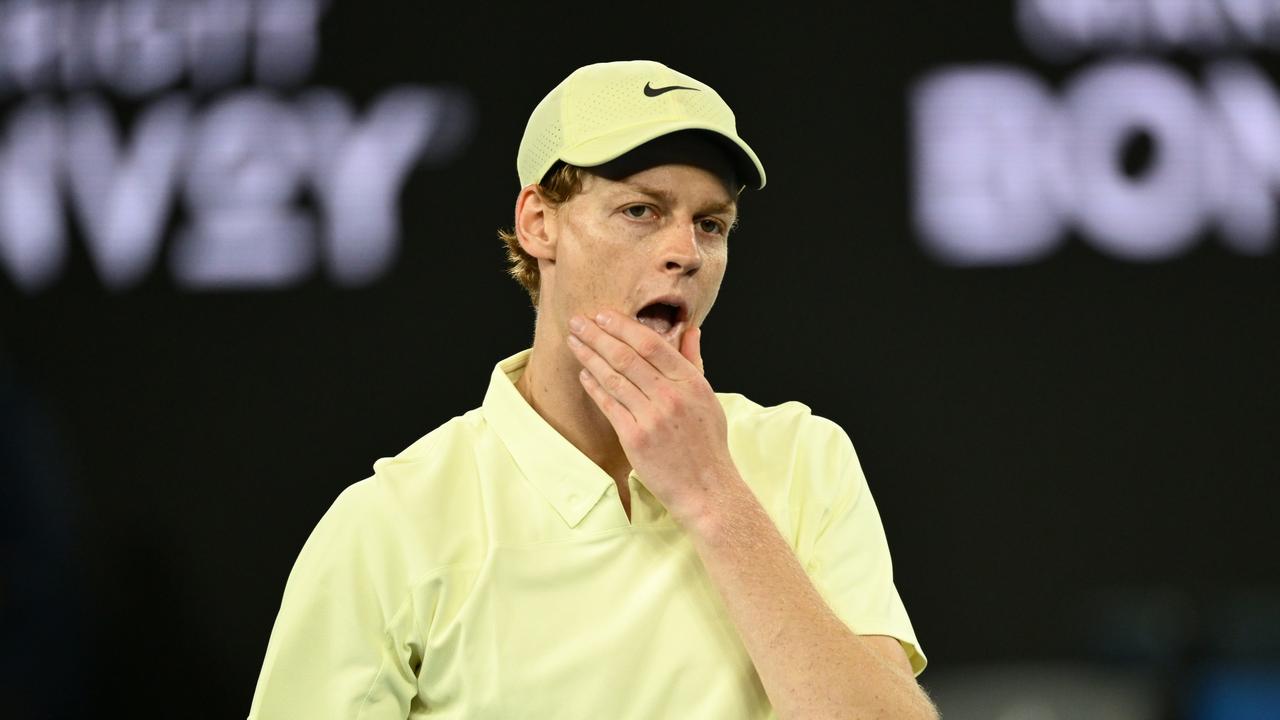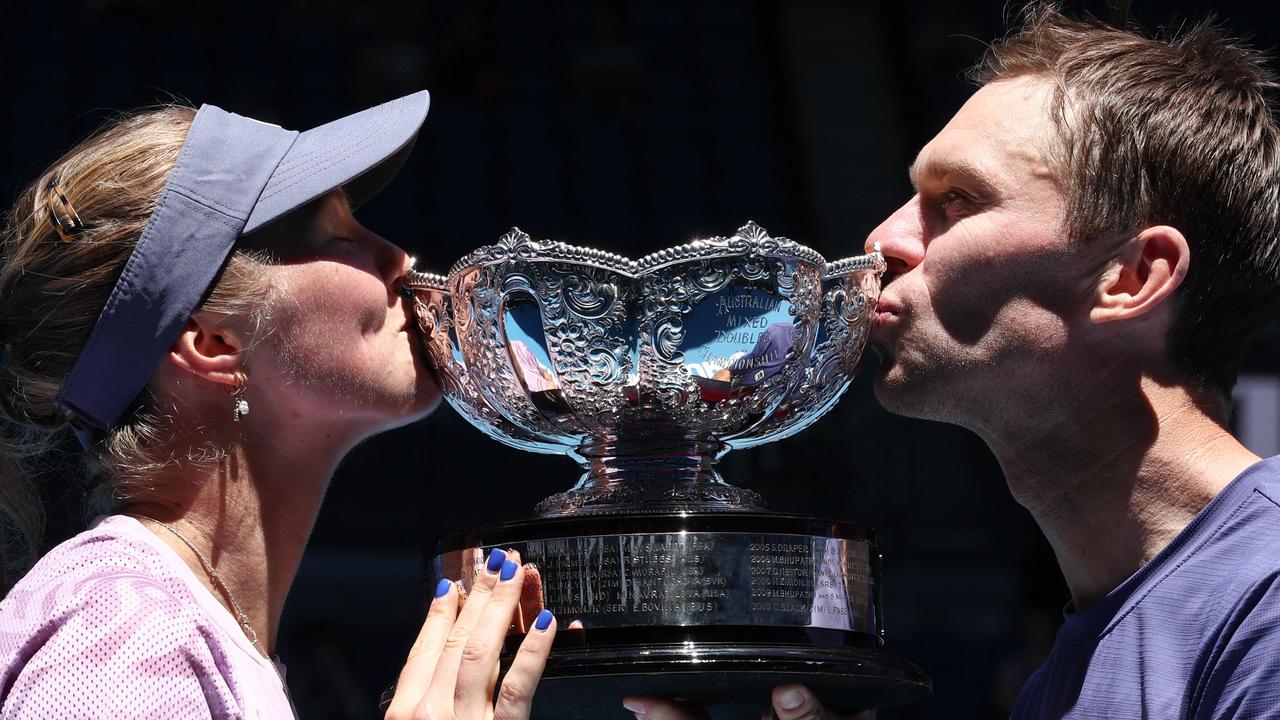’Disgusting’: Tennis doping drama explained as dark cloud hovers
Two of tennis’ biggest stars find themselves under a doping shadow that is hanging over the first grand slam of the year.
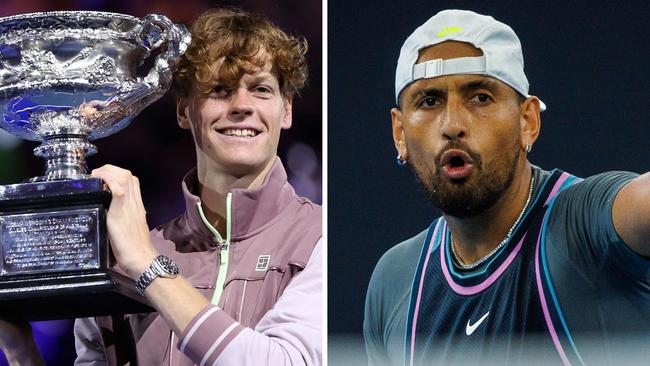
Aus Open
Don't miss out on the headlines from Aus Open. Followed categories will be added to My News.
A doping shadow hangs over the start of tennis’ grand slam season at the Australian Open, with two of the sport’s biggest stars embroiled in a complicated saga that isn’t over yet.
Watch every ball of The 2025 Women’s Ashes Series LIVE with no ad-breaks during play on Kayo | New to Kayo? Get your first month for just $1. Limited time offer.
The two players who spent most of the year at world No.1, Jannik Sinner and Iga Swiatek, both tested positive to a banned substance during the 2024 season - yet both will still be in action at Melbourne Park on Monday.
Swiatek missed a month of tennis, with the International Tennis Integrity Agency accepting she had unintentionally consumed the banned substance trimetazidine (a heart medication) through contaminated sleep assistant melatonin. Her case, while sparking some concern over its initial secrecy, is effectively no longer up for debate.
It’s Sinner, the reigning Australian Open champion, who we really need to talk about. (And who Nick Kyrgios really wants us to talk about.)
Sinner didn’t miss any tennis, though his semi-final result at the Indian Wells event last year was scrapped, and he was technically suspended twice - for a total of four days, both times in-between events.
This is because he tested positive twice; once during Indian Wells on March 10, and once just before the Miami Open on March 18, which he went on to win. He appealed both provisional bans quickly.
On both occasions trace amounts of a metabolite of clostebol, an anabolic steroid which mimics testosterone, were found in the Italian’s system.
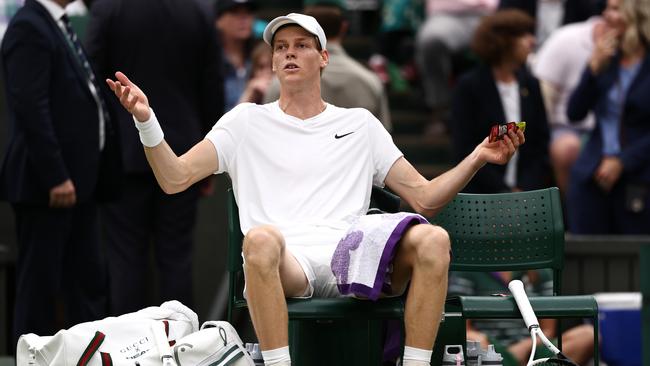
In August, he was cleared of wrongdoing - and the tennis world was shocked to learn of his months-long saga (which had been kept quiet).
Sinner successfully argued he bore “no fault or negligence” for the trace amounts of the substance, which is found in many Italian over-the-counter drugs (and has been found in a number of Italian athletes’ systems in recent years).
His argument was that his physical therapist Giacomo Naldi had applied the substance to his own injured finger, and then a small amount of it had been transferred to Sinner via a back massage and foot treatments, because Naldi had not washed his hands.
It was claimed Sinner asked at one point if Naldi had put any substances on his injured finger, seeing it was bandaged, and the therapist said no - but the clostebol-infused substance was only used two days after Sinner checked.
Much of the controversy around this case came from its secrecy. Many athletes, such as Aussie runner Peter Bol, were incredibly frustrated by the treatment of their own anti-doping sagas - with a provisional suspension handed down, but Bol later being cleared after a false positive.
Even within tennis, there are athletes serving bans for what would seem like lesser charges than even Sinner’s case. Aussie doubles slam champion Max Purcell, for example, admitted he had taken too large of an IV infusion of vitamins while in Bali - not an illegal infusion, just a bit too much of one - and will miss the Australian Open because of it.
Kyrgios has been one of the loudest critics of the Sinner saga, arguing he should have been automatically banned.
“Tennis integrity right now, and everyone knows it, but no one wants to speak about it -- it’s awful,” Kyrgios said last month.
“It’s actually awful and it’s not okay. I know that people don’t like it when I just speak out about things, be honest about things.
“For a kid that grew up playing tennis, I enjoyed the competition, I enjoyed playing.
“I can get emotional, I can throw a racquet, but that’s nothing compared to cheating and taking performance-enhancing drugs.
“He did fail two doping tests at separate times, as well. It wasn’t one after the other -- they were a different time frame, so I mean, if you think that that’s the way that it got in his system, if that’s how you think it’s happened, then.
“But, I mean, if he didn’t do anything wrong, then why did they take his prize money and points away? Obviously they found something wrong with it.”
He added: “I just think that it’s been handled horrifically in our sport. Two world number ones both getting done for doping is disgusting for our sport. It’s a horrible look.”
That part is hard to argue with. And Kyrgios, rightly or wrongly, has continued to campaign against what he sees as a serious problem with tennis.
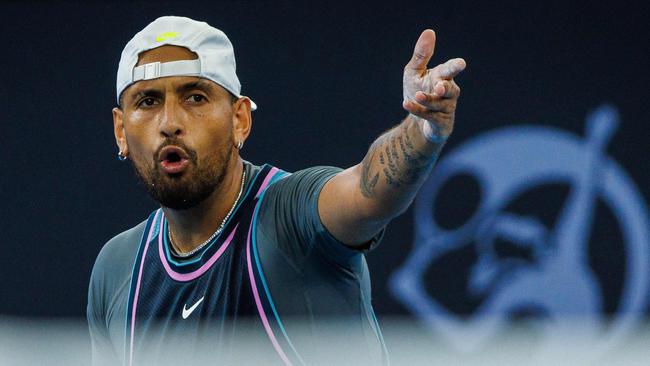
Days before the Open, in a tweet he deleted just minutes later, Kyrgios revealed: “Ahhhh I got randomly drug tested again today.
“That’s about four times in the last two months. Blood as well. Absolutely pointless as even if you test positive you can play anyway.”
The tennis world wants to trust the legal process which has said, so far, that Sinner is innocent. The timing is just really unfortunate.
The Italian’s 2024 was the best season by a man not named Roger Federer, Novak Djokovic or Rafael Nadal in decades. He went the entire year without losing a match in straight sets, the first time that’s happened in men’s tennis since Roger Federer in 2005 - he lost, period, just six times.
And while he didn’t win the French Open or Wimbledon, Sinner was brilliant in his breakthrough Australian Open title win and dominated the US Open. The fact he didn’t win three or four slams probably hides the underlying truth that he is a clear No.1 in the world right now, with Carlos Alcaraz also brilliant but much more prone to bizarre losses - the Spaniard having dropped four of his last seven matches to end 2024.
So Sinner was dominant; exactly the scenario where you don’t want a question mark.
“Yeah, you think about this (coming into the tournament), of course,” he said in his pre-tournament press conference.
“I would lie if I would tell you I forget. No, it’s not like this. It’s something what I have with me now already for quite a long time. But it is what it is. I’m here trying to prepare the Grand Slam.
“I haven’t done anything wrong. That’s why I’m still here. That’s why I’m still playing.”
Asked whether he has changed anything since the positive tests, Sinner explained: “No, because I’ve done the same thing before. As I approach these things, they haven’t changed.
“Before I was very, very careful on every single medicine I take, even what I eat. When the bottle is open, I throw it away, I take a new one.
“I was always very, very careful about this stuff.”
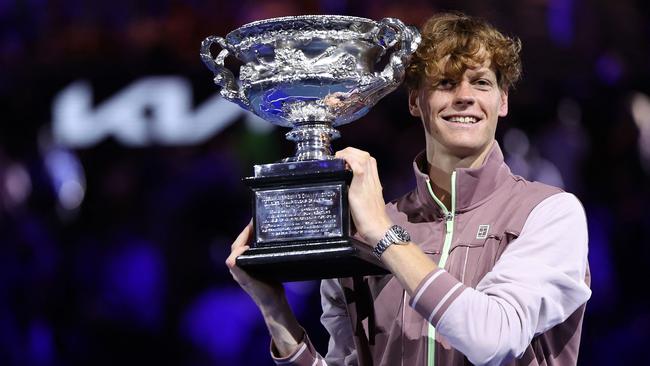
But it’s not as if the saga is over.
Just hours after Sinner spoke at Melbourne Park, the World Anti-Doping Agency announced the hearing for its appeal would be heard on April 16 and 17 at the Court of Arbitration for Sport headquarters in Switzerland.
That timing is less than ideal for the Italian; he could win the Australian Open, showing he’s in the mix for a calendar grand slam, but then have the rest of his season ruined by even a brief ban.
Educated observers believe if CAS does rule against Sinner, a ban around 1-3 months is likely. Since the ruling wouldn’t come out immediately, a short suspension could easily cost him both the French Open and Wimbledon - maybe even the US Open if it stretches to a fourth or fifth month.
“Obviously I’m very disappointed and also surprised of this appeal, to be honest, because we had three hearings. All three hearings came out very positively for me,” Sinner said in September after the appeal was announced.
“We always talk about the same thing. Maybe they just want to make sure that everything is in the right position.”
Again, he has been found innocent so far, and deserves that assumption until otherwise found.
But it’s a rough situation both for Sinner, and men’s tennis as a whole, at a time when it is desperately seeking a new superstar to replace two retired ones and one slowly walking towards the sunset.
Originally published as ’Disgusting’: Tennis doping drama explained as dark cloud hovers



